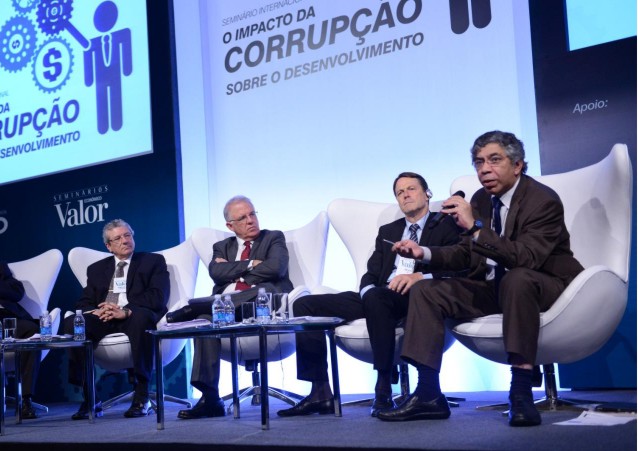Corruption slows down the country's development
Corruption has a significant impact on the economy of Brazil and a continuous commitment from the whole society is needed to prevent its practice. This was the main conclusion of the international seminar “The Impact of Corruption on Development”, held by ETCO in partnership with the newspaper Valor Econômico, on August 15, in São Paulo. The meeting brought together jurists, businessmen, academics, lawyers and representatives of national and international institutions on the subject.
Among those present were the Chief Minister of the Comptroller General of the Union (CGU), Jorge Hage; former Federal Supreme Court (STF) Minister Ellen Gracie Northfleet; the vice president of the World Bank, Otaviano Canuto; the director of the Organization for Economic Cooperation and Development (OECD), Rolf Alter, and the director of Policies and Strategies of the National Confederation of Industry (CNI), José Augusto Fernandes.
The purpose of the event was to provoke a debate about corruption, its consequences for governance and what concrete has been done to combat it. According to the chief executive of ETCO, Roberto Abdenur, “it is essential to discuss corruption in the context of the country's economic development, since it is one of the main factors responsible for the reduction of State revenue with consequences for the loss of competitiveness of companies and in indicators such as the Human Development Index (HDI). “Corruption deprives the poorest of public policies such as health and education, which contributes to the worsening of social inequalities,” says Abdenur.
Considered as one of the main names of the Judiciary in the fight against corruption, Ellen Gracie highlighted the patrimonialism that persists in Brazilian society as one of the social practices that promote the transgression of the public interest by the private. "The path to be followed for a real fight against corruption is to reform institutions and change culture, and not to denounce and try any case without evidence."
Among the main causes of corruption pointed out by the seminar participants, are the lack of transparency in public accounts and the impunity of corrupt and corrupters. According to Minister Jorge Hage, in recent years Brazil has started to invest in transparency, which, together with the greater involvement of citizens, has been causing an increase in the reporting of cases. However, he warns that "more effective legislation is needed to punish legal entities for the practice of corruption, since the lack of such laws distorts markets, drives away investors and compromises development".
In this sense, the Bill of Law 6826/10 - also known as the Anti-Corruption Law - awaiting approval by the Chamber of Deputies, which allows punishing companies that benefit in cases of bribery or corruption practiced by their employees. Speaking at the seminar, the PL rapporteur, federal deputy Carlos Zarattini, commented that "the expectation is that the PL will be approved after the October elections". With its approval, Brazil is no longer - along with Argentina and Ireland - one of the few countries among the 34 signatories to the Convention on Combating Corruption of Foreign Public Officials in International Commercial Transactions of the Organization for Economic Cooperation and Development (OECD) , who did not create specific legislation to punish corrupt companies.
The importance of training public officials was also noted. According to the Director of Policies and Strategies at CNI, José Augusto Coelho Fernandes, the idea is that the State has the capacity to develop projects for the promotion of ethics, with good laws, good instruments of control and governance.
Demetrio Magnoli, a member of the International Conjuncture Analysis Group (GACINT) at USP's International Relations Institute (IRI-USP), made strong criticisms of the Brazilian political system. "Official Brazil celebrates corruption," said Magnoli.
The seminar also included the participation of the vice president of the Board of Directors of AMARRIBO Brasil, Josmar Verillo; the coordinator of the Unesp Corruption Studies and Research Group, Rita de Cássia Biason; the professor of Ethics and Philosophy at Unicamp, Roberto Romano; the political scientist and vice president of Arko Advice, Cristiano Noronha, and the coordinator Movimento Brasil Eficiente, Paulo Rabelo de Castro.
The president of the ETCO Advisory Council, Marcílio Marques Moreira, closed the event. "The fight against corruption is a process in which we will always have new challenges to overcome," he said, leaving a warning: "We are not indignant enough and this complacency can lead us to mediocrity".




